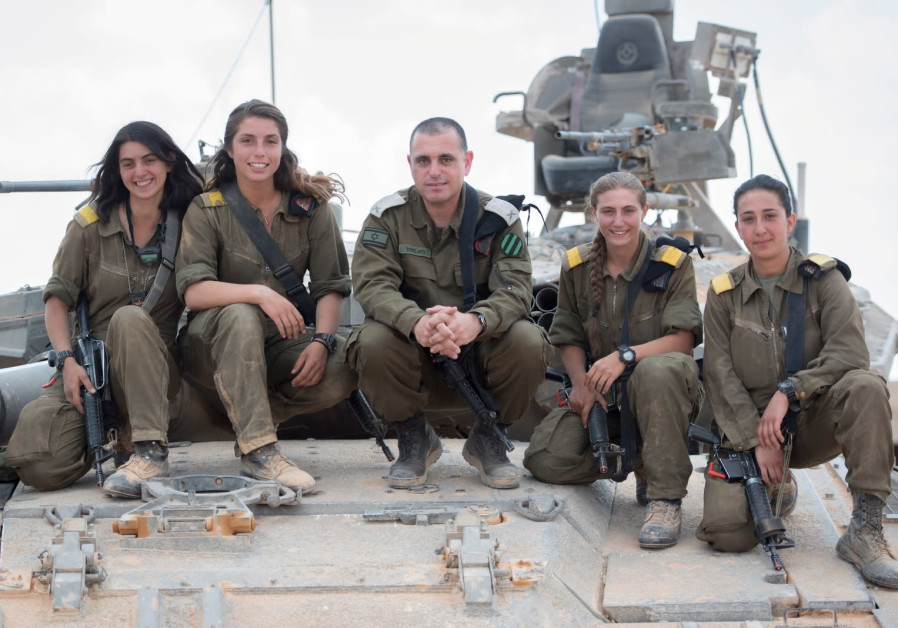First-ever female tank commanders make IDF history

History is made with first four female tank commanders in IDF history. (photo credit: IDF SPOKESPERSON’S UNIT)
For the first time in IDF history, four female soldiers, including a new immigrant from England, have become tank commanders after a 16-month pilot program and will be deployed to the Egyptian border with Division 80, the military announced on Thursday.
“There has never been such an experience in the IDF,” said chief armored officer Brig.-Gen Guy Hasson, adding that the four female tank commanders are “four amazing and determined women.”
“We understand the potential in the operational value of both the Border Defense Forces and the Armored Corps,” Hasson said, stressing that “there is potential here for girls who really want to work for the defense of the state.”
The pilot program began with 15 female recruits beginning basic training in southern Israel, with two recruits dropping out just after two weeks. The 13 remaining recruits then moved to Shizafon where they were divided into three squads headed by a senior tank commander, completing their tank training on the Merkava Mark-3 model, which they would be operating.
This part of the program was designed to test the recruits’ ability to perform routine border security, differentiating them from their male counterparts who also train for all-out war exercises. Throughout the training, the recruits were monitored by army nutritionists, doctors and exercise instructors.
History is made with first four female tank commanders in IDF history (IDF Spokesperson’s Unit)
In December, the recruits finished their training and were applauded by the head of the corps’ training brigade Col. Moran Omer during a ceremony at the Armored Corps monument in Latrun, outside Jerusalem.
“We’re standing before a bit of history. For the first time, a tank operator medal will be pinned on the uniform of female IDF soldiers,” he said.
“You stood up to the difficult physical challenges, learned the profession and, no less importantly, you learned to love the power of metal,” he said.
“We demanded you complete the full and long training program… after you were fully trained as fighters in the Border Defense Force – no simple mission in itself – and you did so successfully.”
One of the first female tank commanders, 20 year-old Sgt. Charlotte Feld-Davidovici made aliya to Israel from England two years ago.
“Becoming one of the first female tank commanders in the IDF means not only do I get to fulfill my role of defending the country, but I also get the opportunity to bring women forward in combat and open up chances for future generations to defend their country just like their male counterparts,” she said.
When the IDF announced that it was considering the possibility of having women serve in the armored corps, several former high-ranking officers and religious groups come out against it, including former IDF chief rabbi Yisrael Weiss.
Weiss argued said that if a male and female soldier are put “into a closed box for a week… you’ll get a little tank soldier in another nine months.”
The IDF responded to the criticism stating that even if the pilot program is deemed successful, there would be no mixed-gender tank crews and female tank crews will not be part of battalions, which would operate in enemy territory. Rather, they would only be deployed to the borders.
Hasson confirmed that there will be no mixed tanks. Every tank under female command will have only female fighters
.
“It’s a first-of-its-kind role for women and opens a door for women for a new roles,” said 20-year-old Noga Shina, another graduate of the course. “People around me think this is a very positive opportunity because this is the first job of its kind and I get to be a pioneer and to be one of the first women in the Armored Corps.”
According to Hasson, if they are required to engage an Islamic State group terrorist squad attempting to infiltrate from Sinai, they will be able to do so.
While an additional three recruits dropped out during their tank training, the other 10 finished and will serve as combat soldiers in the IDF’s Caracal Battalion.
Hasson explained that the reason for the recruits dropping out of the trial was similar to male recruits, with two dropping out due to medical issues not related to the program, two did not meet the requirements and one due to motivation.
“We didn’t give in to them by an inch and we didn’t compromise. It can be said for them that they did it like real fighters,” he said, adding that while they have not yet been involved in any operations, they have partaken in various operational activities like their male counterparts.






Comments are closed.